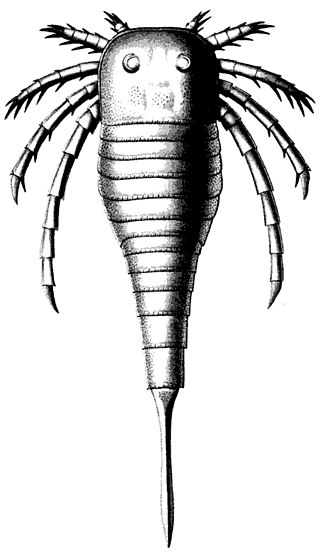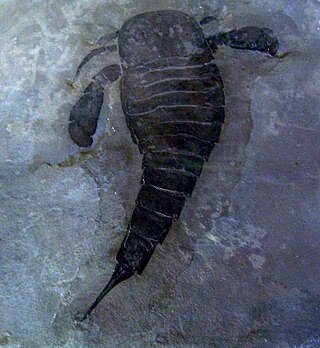
Grossopterus is a genus of prehistoric eurypterid classified as part of the family Waeringopteridae. The genus contains two species, G. inexpectans from Gilboa, United States and G. overathi from Overath, Germany.

Ctenopterus is a genus of prehistoric eurypterid of the family Stylonuridae. It contains only one species, Ctenopterus cestrotus from the Early Silurian of Otisville, New York, United States.
Moselopterus is a genus of prehistoric eurypterid from the Devonian period in Europe. The genus contains three species, M. ancylotelson and M. elongatus from Germany and M. lancmani from Latvia.

Waeringopterus is a genus of prehistoric eurypterids from the Silurian of North America. The genus contains two species, W. apfeli from the Syracuse and Vernon Formations of New York and Ontario and W. cumberlandicus from the Wills Creek Formation, West Virginia. Fossils of the genus also were found in the Indian Point Formation of Quebec.

Kokomopterus is a genus of prehistoric eurypterid. The genus contains a single species, Kokomopterus longicaudatus, known from the Silurian of Kokomo, Indiana.
Tarsopterella is a genus of prehistoric eurypterid classified within the family Hardieopteridae. It contains only one species, T. scotica from the Lower Devonian of Scotland.

Stylonurus is a genus of prehistoric eurypterid of the family Stylonuridae. The genus contains three species: Stylonurus powriensis from the Devonian of Scotland, Stylonurus shaffneri from the Devonian of Pennsylvania and Stylonurus perspicillum from the Devonian of Germany.

Ruedemannipterus is a genus of prehistoric eurypterid classified as part of the family Dolichopteridae. The genus contains one species, R. stylonuroides, known from the Silurian of New York.
Lamontopterus is a genus of prehistoric eurypterid classified within the family Kokomopteridae. It contains one species, Lamontopterus knoxae, from the Early Silurian of Scotland.

Hardieopterus is a genus of prehistoric eurypterid classified within the family Hardieopteridae. The genus contains four species, all Silurian in age; H. lanarkensis and H. macrophthalmus from Scotland, H. megalops from England and H. myops from the United States.

Pagea is a genus of prehistoric eurypterid classified as part of the family Stylonuridae. It contains three species, all from the Devonian ; P. plotnicki from Nunavut, Canada and P. sturrocki and P. symondsii from the Old Red Sandstone of the United Kingdom. The genus is named in honor of David Page, an early worker on the fauna of the Old Red Sandstone and describer of the first Stylonurine eurypterid.

Mycterops is a genus of prehistoric eurypterid of the family Mycteroptidae. Mycterops lived during the Carboniferous period in Europe and North America.

Laurieipterus is a genus of a eurypterid classified as part of the family Stylonuridae. It contains one species, L. elegans from the Early Silurian of Scotland.

Eurypteroidea are an extinct superfamily of eurypterids. It contains three families and two genera of uncertain classification, Paraeurypterus and Pentlandopterus.

Onychopterellidae are an extinct family of eurypterids. The family is the only family classified as part of the superfamily Onychopterelloidea. Genera included are Alkenopterus, Onychopterella and Tylopterella.

Moselopteridae are an extinct family of eurypterids. It is the only family classified as part of the superfamily Moselopteroidea, and contains three genera: Moselopterus, Stoermeropterus and Vinetopterus.

Stoermeropterus is a genus of prehistoric eurypterid from the Silurian period in Europe and North America classified as part of the Moselopteridae family. The genus contains three species, S. conicus and S. latus from Ringerike, Norway and S. nodosus from West Virginia.
Vinetopterus is a genus of prehistoric eurypterid from the Devonian period in Europe classified as part of the Moselopteridae family. The genus contains two species, both from Germany: V. struvei and V. martini.

Paraeurypterus is a genus of prehistoric eurypterid from the Late Ordovician period. The genus contains one species, P. anatoliensis, known from Şort Tepe in Turkey. Classified as part of the Eurypteroidea superfamily, it has not yet been possible to classify it as part of any particular family.
Pentlandopterus is a genus of prehistoric eurypterid from the Late Ordovician period. The genus contains one species, P. minor, known from the Pentland Hills in Scotland. Classified as part of the Eurypteroidea superfamily, it has not yet been possible to classify it as part of any particular family.













